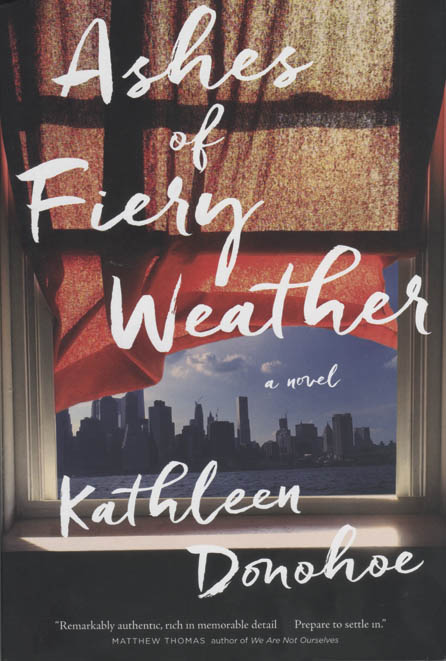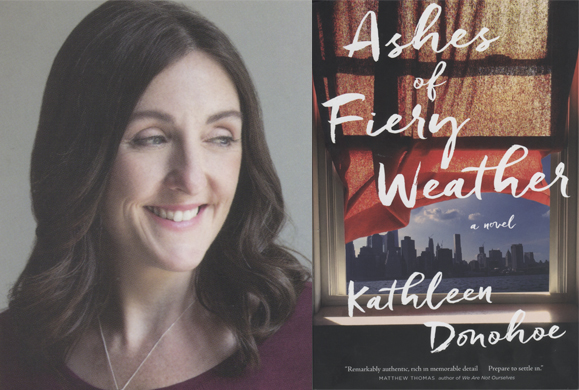Kathleen Donohoe’s debut novel is a stunning and intimate portrayal of four generations of New York City firefighters that puts women at the forefront.
℘℘℘
The Irish tradition in the New York City Fire Department is undeniably rich. But it also must be said that stories of the FDNY inevitably tilt towards the male perspective, since the department has only been hiring females since the early 1980s, following a contentious court battle.
But in her absorbing and compelling first novel, Ashes of Fiery Weather, Kathleen Donohoe manages to tell a decades-spanning story of firefighters that also puts female characters at the forefront. There are wives and widows, yes, but also an Irish-born female firefighter. As much an Irish immigrant novel as it is an FDNY story, Ashes of a Fiery Weather – the title comes from the mournful Wallace Stevens poem “Our Stars Come from Ireland” – opens in 1983 at a Brooklyn funeral. Galway-born Norah O’Reilly is mourning the loss of her firefighter husband Sean, who was killed in the line of duty.
“Norah scanned the faces of the assembled firemen, three deep from the curb to the street, skipping the mustached, the older guys, the not-tall, the dark-haired, the obviously non-Irish, the ones in white caps, who were the officers. She didn’t see Sean. She saw Sean a hundred times,” writes Donohoe, who herself hails from a New York family with a rich firefighting tradition.

416 pages / $26)
Donohoe’s opening section is an emotional tour-de-force, exploring beautifully this most harrowing moment of Norah’s life, as well as the circumstances that led to her emigration.
From there Donohoe – having already made the ambitious decision to tell a story stretching back to the 19th century – steps back in time, though not chronologically. Instead, Ashes of Fiery Weather zigs and zags into and out of the decades, introducing us to the extended Keegan-O’Reilly clan.
There’s Sean’s mother, Delia, growing up in Brooklyn on the eve of World War II. Foremost in Delia’s mind, however, is not the global situation but instead the intense emotions she is feeling for her friend Claire. (What a playful touch to have Delia, at one point, reading the classic The Heart is a Lonely Hunter.)
Then there’s Annie-Rose Devlin, at the turn of the century, who lives through the consolidation of the five boroughs of New York City in 1898, and liked that her name “was a flower, but even more that it was a verb.”
Childhood wordplay, however, yields to an adulthood scarred by the infamous Spanish flu epidemic of 1918.
Then there is Ellen O’Reilly. She was born Eilis in Ireland and adopted by Delia, who was unable to have more children.
Eileen, of course, already lost her brother Sean to a fire back in 1983. Nevertheless, Eileen is determined – to put it mildly – to continue the family tradition. She is part of the first group of female firefighters to get on the job and must endure ruthless abuse. (Indeed, Donohoe is also to be commended for even-handedness. The bravery and sacrifice of firefighters is clear in this book but these men are far from flawless.)
It is Eileen who brings the reader inside the FDNY’s darkest day, as well as the culmination of Donohoe’s novel, September 11, 2001.
“The moon was edgeless, with air like fog just solid enough to breath,” writes Donohoe. “The moon was on fire. The moon was filled with firefighters wandering its rock surface.”
Eileen’s disorientation at “the pile” just after the collapse of the twin towers gives way to a realization that her nephew, Sean’s son Aidan, was also among the first responders. She must find out if he is among the survivors or victims.
Donohoe also explores past and, in some cases, forgotten tragedies the FDNY endured and even manages to use some of them to foreshadow 9/11. There was the infamous day in 1960 when two planes collided over New York City and fell from the sky, scattering debris across Staten Island as well as Park Slope, Brooklyn. Meanwhile, Annie-Rose witnesses a horrific turn-of-the-century hotel fire which was so intense, the “hotel guests began to jump. The thump, thump, thump of bodies hitting the sidewalk sounded like the drum in the pipe band.”
For all of this harrowing material, however, Ashes of Fiery Weather also manages to capture the poetry of daily Irish Catholic life, which includes Mass and prayer, but also same-sex romance and debates over abortion. This only makes Donohoe’s debut all the more extraordinary. Ashes of a Fiery Weather somehow manages to be part Alice McDermott, part Denis Leary, and ultimately a worthy addition to the canon of great New York ethnic novels. ♦


Leave a Reply